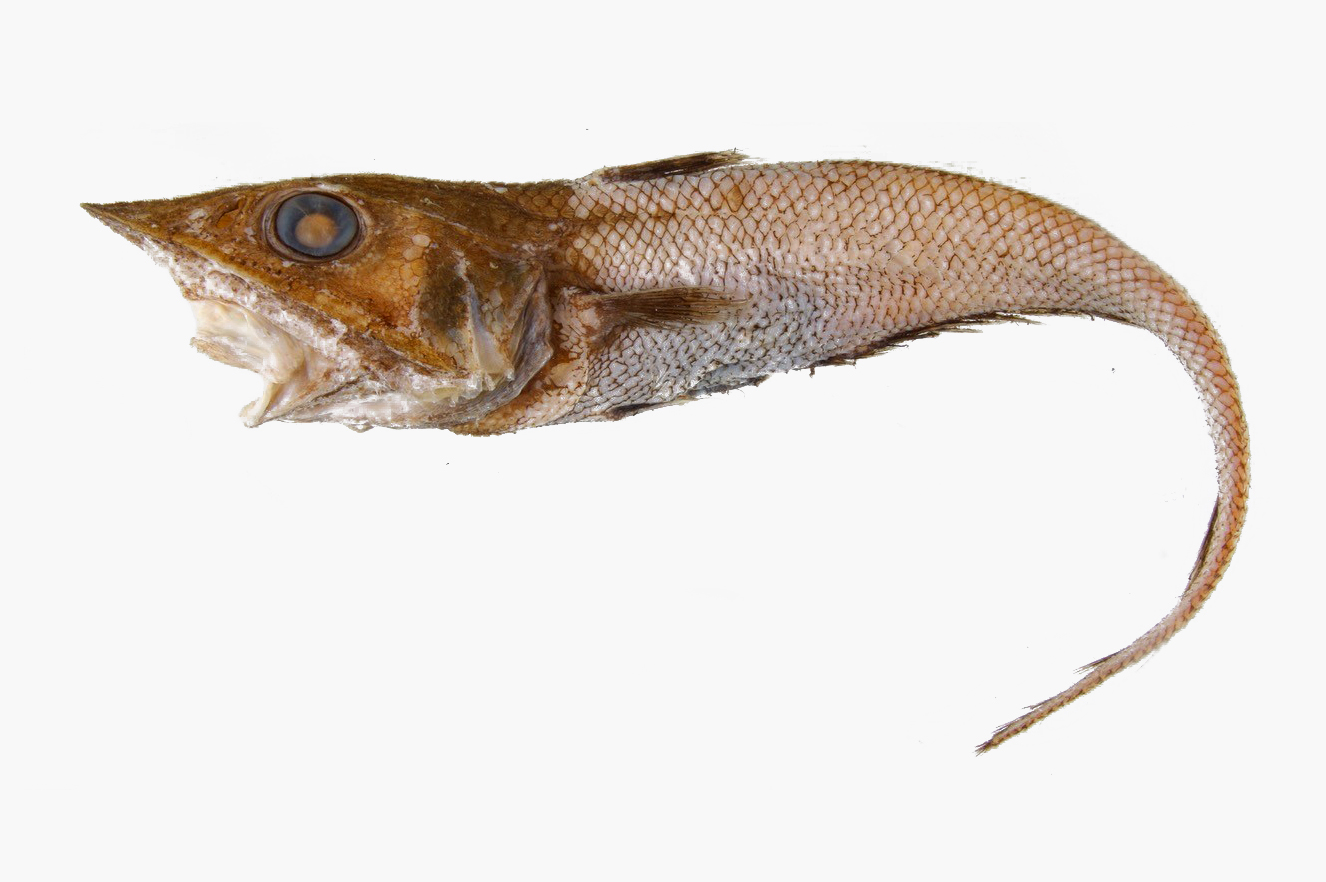Okamura’s Grenadier, Coelorinchus okamurai Nakayama & Endo 2017

The holotype of Okamurai's Grenadier, Coelorinchus okamurai, MZB 23338, from the eastern Timor Sea, northwest of Bathurst Island (SW of Timor Leste), depth of 610–690 m. Source: Naohide Nakayama / Kochi University Museum, Japan. License: All rights reserved
Summary:
A dark grenadier with uniformly blackish fins and no prominent markings.
The underside of the head is mostly naked, with small scaly patches sparsely scattered over the surface, and a moderately long sharply-pointed snout tipped with an acute distinctly flattened terminal scute. The lateral nasal ridge is completely supported by the nasal bone, and is not strongly convex when viewed from above. The light organ is short, with the anterior margin falling far short of the pelvic-fin bases. The premaxillary teeth are arranged in a short, uniformly wide band, and the body scales are covered with widely divergent rows of spinules.
The underside of the head is mostly naked, with small scaly patches sparsely scattered over the surface, and a moderately long sharply-pointed snout tipped with an acute distinctly flattened terminal scute. The lateral nasal ridge is completely supported by the nasal bone, and is not strongly convex when viewed from above. The light organ is short, with the anterior margin falling far short of the pelvic-fin bases. The premaxillary teeth are arranged in a short, uniformly wide band, and the body scales are covered with widely divergent rows of spinules.
Cite this page as:
Bray, D.J. 2020, Coelorinchus okamurai in Fishes of Australia, accessed 02 Jul 2025, https://fishesofaustralia.net.au/Home/species/5329
Okamura’s Grenadier, Coelorinchus okamurai Nakayama & Endo 2017
More Info
|
Distribution |
Known only from the eastern Timor Sea near the border of Australia and Indonesia, northwest of Bathurst Island (SW of Timor Leste and S of Leti Islands, Indonesia), depth 610–690 m, within Australia's Extended Continental Shelf (ECS). |
|
Features |
A species of Coelorinchus with the following combination of features: snout moderately long, acutely pointed in lateral and dorsal views, length 39–42% of HL; lateral nasal ridge completely supported by nasal bone; light organ short, length less than 1/2 orbit diameter, its anterior margin falling far short of pelvic-fin bases; premaxillary teeth in short, uniformly wide band, with posterior end of the tooth band not reaching lateral corner of mouth; no teeth especially enlarged; body scales covered with short, reclined, narrowly blade-like spinules in widely divergent rows; buttresses of body-scale spinules poorly developed; occipital scales covered with divergent rows of short, erect, needle-like spinules; nasal fossa usually naked (a few small scales rarely present anteroventrally); patches of small scales sparsely distributed on ventral surface of head; scales on underside of head bearing 1–3 rows of short, erect, needle-like to knife-like spinules; interdorsal space longer than first dorsal-fin base length; subopercle terminating as a long, slender flap (Nakayama & Endo, 2017). |
|
Etymology |
The species is named okamurai, in honour of Dr. Osamu Okamura (Professor Emeritus of Kochi University, deceased), who collected the type specimens of this species. |
|
Species Citation |
Coelorinchus okamurai Nakayama & Endo 2017, Ichthyol. Res: 2, Figs. 1-3, 4a-d, 5. Type locality: Timor Sea, south of Leti Islands, 9°27.0'S, 127°58.6'E - 9°28.5'S, 127°56.1'E, depth 610-690 metres. |
|
Author |
Bray, D.J. 2020 |
|
Resources |
Okamura’s Grenadier, Coelorinchus okamurai Nakayama & Endo 2017
References
Horikoshi, M., Ohta, S., Okiyama, M., Shigei, M., Imajima, M, Takeda, M., Gamo, S., Noda, H., Irimura, S., Nakamura, K., Hiruta, S., Kito, K., Ito, T., Hoshino, T. & Okamura, O. 1983. Preliminary catalogue of benthic organisms collected at each station during various cruises of R/Vs Tansei-maru and Hakuho-maru, Ocean Research Institute, University of Tokyo (1966–1982). In Horikoshi, M., Ohta, S., Shirayama, Y. & Tsuchida, E. (eds) Report for a part of the result of grant-in-aid for co-operative research (A), Ministry of Education, Science and Culture, No. 00534033. Ocean Research Institute, University of Tokyo, Tokyo, pp 1–160 (p. 117, as Coelorhynchus (Oxygadus) sp.)
Nakayama, N. & Endo, H. 2017. A new species of the grenadier genus Coelorinchus (Actinopterygii: Gadiformes: Macrouridae) from the Timor Sea, Eastern Indian Ocean. Ichthyological Research DOI 10.1007/s10228-017-0585-4 Abstract



